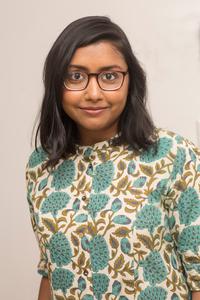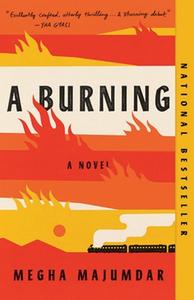
|
|
| photo: Elena Seibert | |
Megha Majumdar's debut novel, A Burning, was published last year. Majumdar was born and raised in Kolkata, India, and came to the U.S. as an undergraduate at Harvard University. She received a master's in social anthropology from Johns Hopkins University and works as a senior editor for Catapult Books. Propelled by a suspenseful, fast-paced plot and characters from across India's social spectrum, A Burning (available in paperback from Knopf, $16; reviewed below) explores complex themes of class, race, nationalism and ambition in contemporary India.
Congratulations on the phenomenal success of your debut novel, A Burning. What were your hopes for the book when it was published?
Thanks so much! I hoped it would find readers who would come to it with thoughtfulness and care, who might find it energizing to think with, who might find it an instrument for thinking about injustice in their own lives and communities. I should say I hoped for these things but did not at all expect any of it! Releasing a book in a pandemic was not how I'd imagined it would go.
The story involves the fateful interaction between a poor Muslim girl, a transgender actress and an opportunistic teacher steeped in Indian nationalism. What was it about this unusual combination of characters that caught your imagination?
I was thinking about the characters as ways for me to forcefully ask the central question of the book: How does one pursue big dreams in a time of rising extreme nationalism? What kind of sacrifices and calibrations does that pursuit require? I felt that each character allowed me to open up a facet of that question. The schoolteacher, for instance, was fascinating to write. He's a person who's somewhat disappointed with his life, and then gets an opportunity to claim some power within a political party. What would such a person give up to hold onto this power? How would they find their moral center?
The immediacy of the present in A Burning captures readers' attention and lets them experience events as they unfold. It's a powerful strategy, with favorable comparisons to the works of William Faulkner and V.S. Naipaul. Can you share the advantages of such an approach?
I'm glad you felt so! I was happy to write the places that I know so well--a street where there's a guava vendor, a train station, a new mall. And it was interesting to write not just the textures and visuals of those places but also the hidden logics and the humor and the energy.
 You're an editor at Catapult Books--how does being an industry insider affect your writing process?
You're an editor at Catapult Books--how does being an industry insider affect your writing process?
I find it hugely energizing. Being close to the art of others is an incredible privilege, and getting to discuss structure, scene, sentences with them? Amazing!
Since your home, New York City, was on the frontlines of the pandemic, you had a close-up view of how elected leaders responded to the crisis. What has that experience taught you about power and accountability?
I don't know that I've really had a close-up view, that would be doctors and nurses and frontline workers, I think! But I really appreciate the question and I'm still thinking through it. The profound ways in which we were abandoned by the people in power. The crushing ways in which our systems and institutions let us down. And, at the same time, seeing people come together in initiatives like the one started by the writer Sarah Thankam Mathews, who has been running a mutual aid society called Bed-Stuy Strong. Perhaps going forward we will think differently about community, meaningful political representation, meaningful resource-sharing.
What is fiction's role in helping us process life-altering events?
I see fiction as a field of questions, a chance to ask questions that matter. There's power in the asking.
Does your academic background in social anthropology come in useful when writing fiction?
One thing anthropology taught me was to look for complexity and surprise. How do people reflect on their own experiences? How do they upturn the expectations of ethnographers and other observers? And that attention to what's unexpected, what's not simple or flattened but is full of nuance, is a wonderful kind of attention for a fiction writer to cultivate.
What advice can you offer for emerging novelists honing their craft?
I have so much to learn, and I wish I could turn this question back to the novelists reading this! One thing I'll share is a clarifying question that I bear in mind when I come to my own pages as well as read manuscripts: What is the ambition of this book? It's a separate question from asking what a book is about or what happens in it. What does it want to achieve, what does it want to contribute? Having a one-line answer for that was very helpful for me when I was working on A Burning.
Looking ahead to the rest of 2021, what are you most excited about?
I'm excited about all the new books coming! Jocelyn Nicole Johnson's My Monticello and Mayukh Sen's Taste Makers, to name two books coming this fall that I think will spark lots of conversation. --Shahina Piyarali, reviewer

